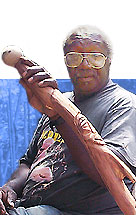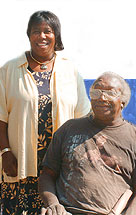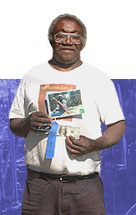 Mr. Williams shows one of his hand-carved walking sticks. |

Equal parts craftsman, artist, teacher and storyteller, Charles “CC” Williams has a lifetime of knowledge and the willingness to share it.
Mr. Williams’ roadside stand on Highway 17 south of McClellanville is a local landmark.
There you’ll find hand-carved walking sticks and canes and handmade cast nets, all made with the skill, patience and grace of a time long past. You’ll also find a man whose steady, positive approach to Type 2 diabetes is an example for others to follow. He controls his diabetes. His diabetes doesn’t control his busy life. “When you have diabetes for so long, you know to listen to your body,” he says. “If you sit around and worry about diabetes and don’t do anything about it, you’ll be in worse shape. Diabetes does not stop me.”
A Vietnam veteran and long-time U.S. Naval Investigator at the Charleston Navy Base, Mr. Williams was diagnosed as diabetic about 10 years ago at the Veterans Hospital in Charleston. His wife – also diabetic – recognized his symptoms and encouraged him to see a doctor.
“I did not know I was diabetic.”
“My diabetes was diagnosed almost as a joke. I was kind of tricked into going for the test by my wife. I really didn’t know they were going to look for sugar. My wife knew. When they tested me, the doctors couldn’t believe it. My numbers were so high, and here I was still going. I was a walking disaster. I mean it was serious. My numbers were way up there past 800. They worked on me; took good care of me. After I learned about what to do, what to eat, checking my sugar numbers, I did it all. I cooked all the right foods and watched everything. I learned about exercise, diet and all of that. I did it all for a while.”
 Sheila Powell, REACH 2010 community health advisor, visits with Mr. Williams. |
Mr. Williams’ life as a Lowcountry craftsman provides plenty of opportunities for both physical exercise and sharing his experiences with visitors to his roadside stand in the Buck Hall community of northern Charleston County. He walks the area’s woods, searching for just the right pieces of tupelo, cherry, oak, sweet gum, dogwood and cedar.
 Mr. Williams holds the picture of him that won First Place in the South Carolina Rural Health Association Annual Photo Contest. |
He knows wood like he knows the local creeks to shrimp. Sitting on a folding chair in the shade of a live oak, he carves sticks, strings nets, weaves stories, and teaches those willing to stop and listen.
Mr. Williams treats visitors like eager apprentices. He introduces you to the many tree limbs he has collected. He greets each piece of wood like an old friend. You’re never quite sure which is his favorite, and it doesn’t really matter. By watching and listening, you learn about the natural textures and colors of wood, about Lowcountry culture, about the land, about the man.
As he works, Mr. Williams talks about his life in the Navy, his family, his diabetes, and everything in between. In 1998, his family’s house burned down. He wasn’t worried; he started over. Mr. Williams is always happy to share his philosophy of life “Don’t try to be what you ain’t if you ain’t what you are,” he says.
Mr. Williams’ work has been featured in the Georgetown Times, the South Carolina Wildlife magazine, a McClellanville cookbook, the Charlotte Observer, and the Charleston Post & Courier. Invited to participate in folklife festivals and community events, he helps preserve the traditional arts, crafts and culture of South Carolina. In the meantime, he tends his garden, carves canes, makes cast nets, and makes friends of strangers. He just plain keeps busy.
“Diabetes does not stop me,” he says. “You have to keep going, stay active, get out and do things. I think that’s the most important thing.”
His calm voice reflects the quiet countryside around him. But his laughter comes with the love of wood that his father gave him, and he passes it along. He hopes that young people will listen and learn from him. He knows diabetes and a whole lot about living well.
To learn more:
See the Diabetes section in South Carolina's Biggest Health Problems for more information about diabetes.
- Helping a Family Member with Diabetes
(American Academy of Family Physicians)
- Read a handout about Helping a Family Member with Diabetes.
- https://familydoctor.org/helping-a-family-member-who-has-diabetes/
- Am I at Risk for Type 2 Diabetes?
(National Diabetes Information Clearinghouse: NDIC)
- https://www.niddk.nih.gov/health-information/health-topics/Diabetes/type-2-
diabetes-taking-steps-lower-your-risk-diabetes/Pages/index.aspx - Diabetes Tests & Diagnosis
(National Diabetes Information Clearinghouse: NDIC)
- Find out how diabetes is diagnosed.
- https://www.niddk.nih.gov/health-information/health-topics/Diabetes/diagnos
is-diabetes-prediabetes/Pages/index.aspx - Fitness
(American Diabetes Association)
- This section of the American Diabetes Association covers fitness. Topics include overcoming barriers, types of exercise, getting started, and nutrition. Learn how physical activity and exercise can help you feel better both physically and mentally.
- https://www.diabetes.org/fitness
Last Modified: Monday November 04, 2019 11:31 AM

